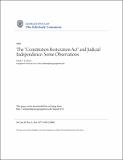| dc.contributor.author |
Mark V. Tushnet |
| dc.coverage.spatial |
Estados Unidos |
| dc.date.accessioned |
2016-01-07T15:29:11Z |
| dc.date.available |
2016-01-07T15:29:11Z |
| dc.identifier.uri |
http://desa1.cejamericas.org:8080/handle/2015/3511 |
| dc.description.abstract |
This Essay uses the proposed Constitution Restoration Act of 2005 as the vehicle for exploring some aspects of contemporary concerns about judicial independence and the mechanisms available to control what might be perceived as abuses of judicial authority… I doubt that the Act has a serious chance of enactment, but its introduction provides an opportunity to examine some difficulties associated with congressional control of judicial decision-making. I begin by treating the Constitution Restoration Act as a real statute, asking what its substantive terms mean. I argue that there is substantial tension between what the Act says and what its sponsors manifestly hope to accomplish. In addition, I note some constitutional questions about the Act. I then turn to the enforcement clauses. After briefly examining the proposition that the grounds for judicial impeachment are unconstrained by law, I argue that the function of the enforcement clauses is to provide a legal justification for impeachment. And that justification is available even though the statute may not in fact prohibit the behavior that Supreme Court justices have engaged in, and even though the statute might in fact be unconstitutional in some sense. This, however, returns us to the proposition that there are no legal constraints on judicial impeachment. |
| dc.description.abstract |
Reseña: This Essay uses the proposed Constitution Restoration Act of 2005 as the vehicle for exploring some aspects of contemporary concerns about judicial independence and the mechanisms available to control what might be perceived as abuses of judicial authority… I doubt that the Act has a serious chance of enactment, but its introduction provides an opportunity to examine some difficulties associated with congressional control of judicial decision-making. I begin by treating the Constitution Restoration Act as a real statute, asking what its substantive terms mean. I argue that there is substantial tension between what the Act says and what its sponsors manifestly hope to accomplish. In addition, I note some constitutional questions about the Act. I then turn to the "enforcement" clauses. After briefly examining the proposition that the grounds for judicial impeachment are unconstrained by law, I argue that the function of the enforcement clauses is to provide a legal justification for impeachment. And that justification is available even though the statute may not in fact prohibit the behavior that Supreme Court justices have engaged in, and even though the statute might in fact be "unconstitutional" in some sense. This, however, returns us to the proposition that there are no legal constraints on judicial impeachment. |
| dc.language.iso |
Inglés |
| dc.title |
The "Constitution Restoration Act" and Judicial Independence: Some Observations |
| dc.ceja.source |
Fuente: <a href="http://scholarship.law.georgetown.edu/cgi/viewcontent.cgi?article=1254&context=facpub">http://scholarship.law.georgetown.edu/cgi/viewcontent.cgi?article=1254&context=facpub</a> |

